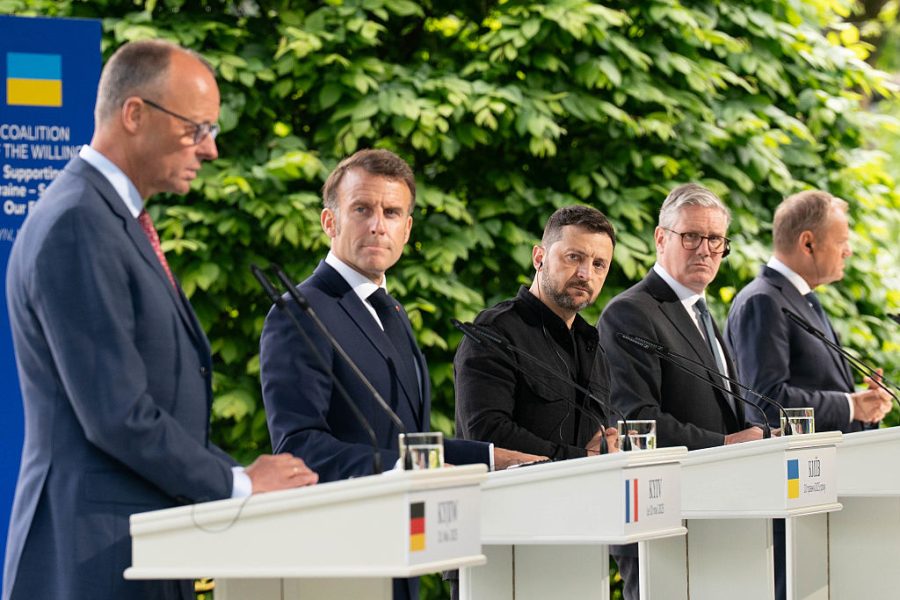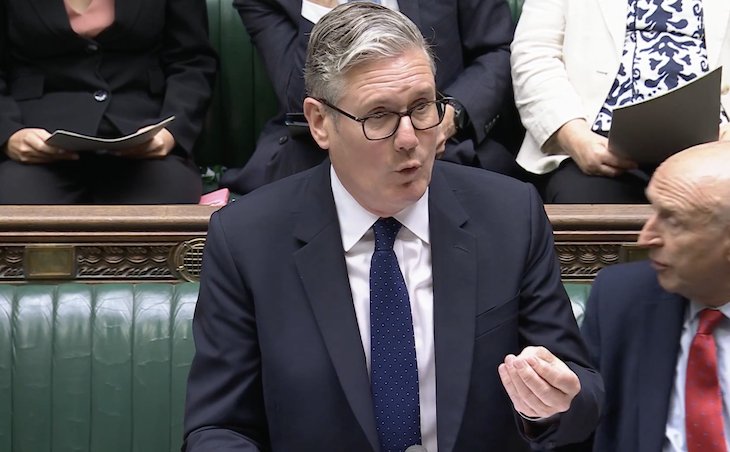Following years of requests, pleas and false starts, Ukraine has, it appears, definitively been given permission to fire missiles deep into Russian territory. Since the start of Moscow’s invasion in 2022, Kyiv had been banned from attacking military targets on Russian soil with western-made weapons. Now, after three years of war, it appears Ukraine’s allies have indeed decided to allow it to retaliate as it sees fit.
The news of the change of tack by Ukraine’s allies came yesterday from Friedrich Merz, Germany’s new chancellor. Speaking at an event in Berlin, the Chancellor revealed that ‘there are no longer any range restrictions on weapons delivered to Ukraine. Neither by the British, nor by the French, nor by us.’ Even the Americans were on board with allowing Ukraine to strike deeper into Russia, Merz said. Alluding to the fact that the ban on Kyiv using long-range missiles to target military bases on Russian soil amounted to Ukraine fighting with one hand tied behind its back, Merz added: ‘A country that can only counter an aggressor on its own territory is not adequately defending itself.’ Today, the German chancellor clarified that range restrictions had been lifted ‘for months’.
Merz is signalling that he is prepared to lead Europe’s support for Ukraine from the front
Merz’s announcement coincided with an unexpected outburst by Donald Trump on his platform Truth Social, in which he laid into his Russian counterpart: ‘I’ve always had a very good relationship with Vladimir Putin of Russia, but something has happened to him. He has gone absolutely CRAZY!’ Putin’s ambition to conquer the whole of Ukraine would ‘lead to the downfall of Russia’, Trump warned – although he didn’t specify how.
Despite a little confusion initially about whether Merz was referring to a fresh relaxation of the parameters on how Kyiv can respond to Putin’s invasion, it appears the German chancellor was referring to decisions taken by the US, UK and France late last year. Ukraine received permission from Joe Biden’s administration to use ATACMS missiles with a maximum range of 190 miles on military targets inside the Russian border region of Kursk, where Kyiv’s forces were attempting to hold onto territory seized during an impressive incursion launched last August. Although it was never confirmed, Britain and France were, around the same time, reported to have given permission for Kyiv to use Storm Shadow/SCALP missiles, with a range of 150 miles, for a similar purpose.
Allowing Ukraine to now use these missiles at their maximum ranges would, in theory, allow Zelensky’s troops to target upwards of 13 airbases inside Russia being used to launch attacks on Ukraine. They would also bring the cities of Voronezh and Volgograd into range, although Merz’s statement suggests Ukraine’s allies would not endorse strikes on non-military targets.
Trump’s criticism of Putin, meanwhile, came in response to two of the largest drone attacks Ukraine has experienced at Moscow’s hands since the start of the war. According to Ukrainian officials, the Kremlin fired 298 drones and several cruise missiles into the country on Saturday night, killing 12. On Sunday night this increased to 355 drones and nine cruise missiles, resulting in at least 18 casualties.
The Kremlin responded predictably to Merz’s revelation, decrying Ukraine’s allies as having made ‘dangerous decisions’. With no hint of irony, Moscow’s spokesperson Dmitry Peskov added that they ‘absolutely run counter to our aspirations to reach a political settlement’. Putin’s administration made similar remarks at the end of last year, and it is worth noting that Moscow did little to follow through with its vague threats of consequences for the West.
With Putin showing no sign of easing up on his attacks on Ukraine, Trump is clearly becoming increasingly frustrated with his inability to bring the Russian president to the negotiating table. According to the Wall Street Journal this morning, the White House is considering bringing in further sanctions against Moscow before the end of the week in an effort to pressure Putin into meaningful discussions. If, however, as the reports suggest, economic sanctions still remain out of the question, it is unclear how effective any new measures against Moscow would be.
Merz’s move to confirm the decision to allow Ukraine to strike as far into Russia as needed is nevertheless a mood change. Governments on both sides of the Atlantic have historically been nervous of giving Ukraine too much military assistance too quickly for fear of triggering an escalation that drags more of Europe into direct war with Russia.
With his announcement yesterday, Merz is signalling that, as Germany’s new chancellor, he is prepared to lead Europe’s support for Ukraine from the front. Days after Merz’s election as chancellor earlier this month, his administration announced they would no longer be publishing details of weapons donations to Ukraine in order to avoid giving Russia an insight into Kyiv’s arsenal. Now focus will inevitably turn to whether Merz will follow through on a campaign pledge he made ahead of February’s federal election to hand over Taurus missiles to Ukraine, which would put Moscow within striking distance of Zelensky’s troops.
This would be far from an uncontroversial decision: there is a large – and growing – base of resistance in Germany to sending any more weapons, or indeed aid, to Kyiv. Merz handing over Taurus missiles to Zelensky would no doubt embolden the anti-Ukraine far-right Alternative für Deutschland party, currently supported by a quarter of Germans. Nevertheless, if Merz is true to his word, we are unlikely to know if Berlin has handed any Taurus missiles to Kyiv until they land on Russian soil.








Comments